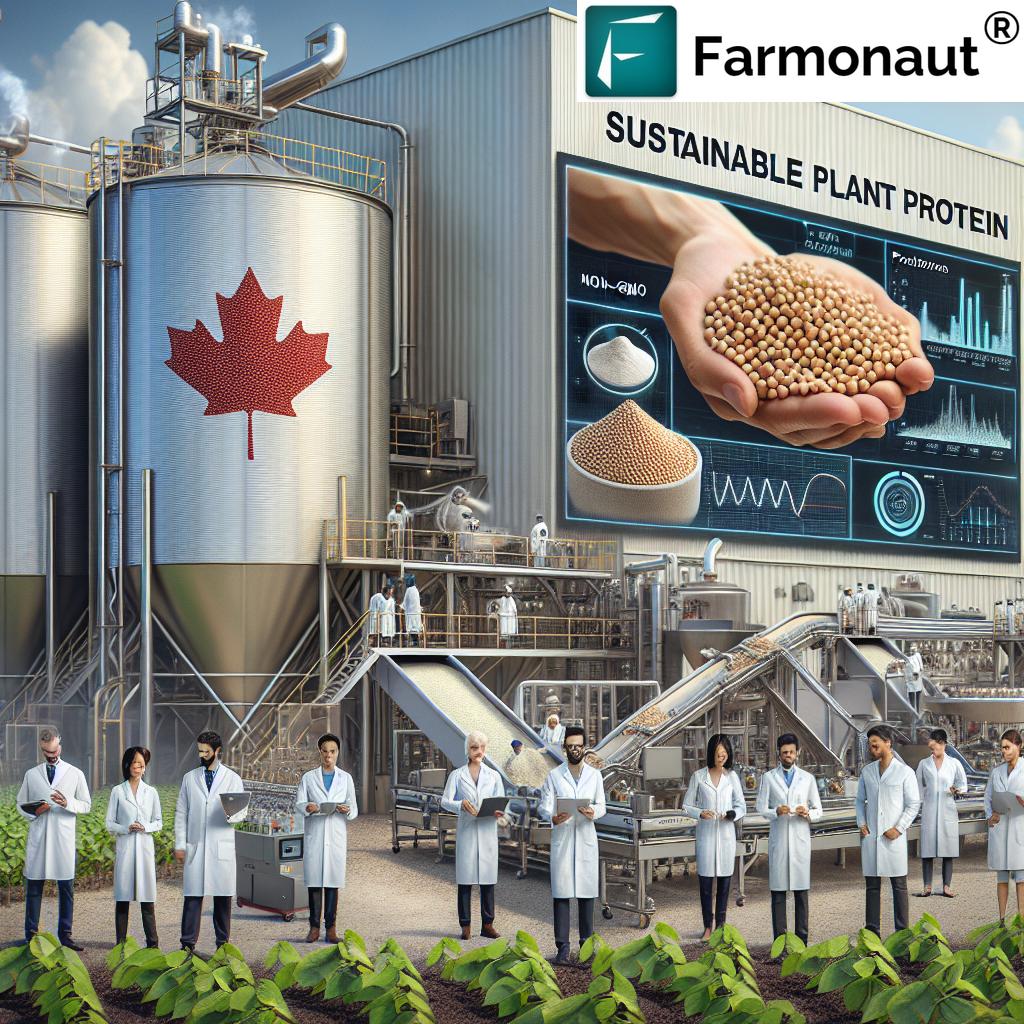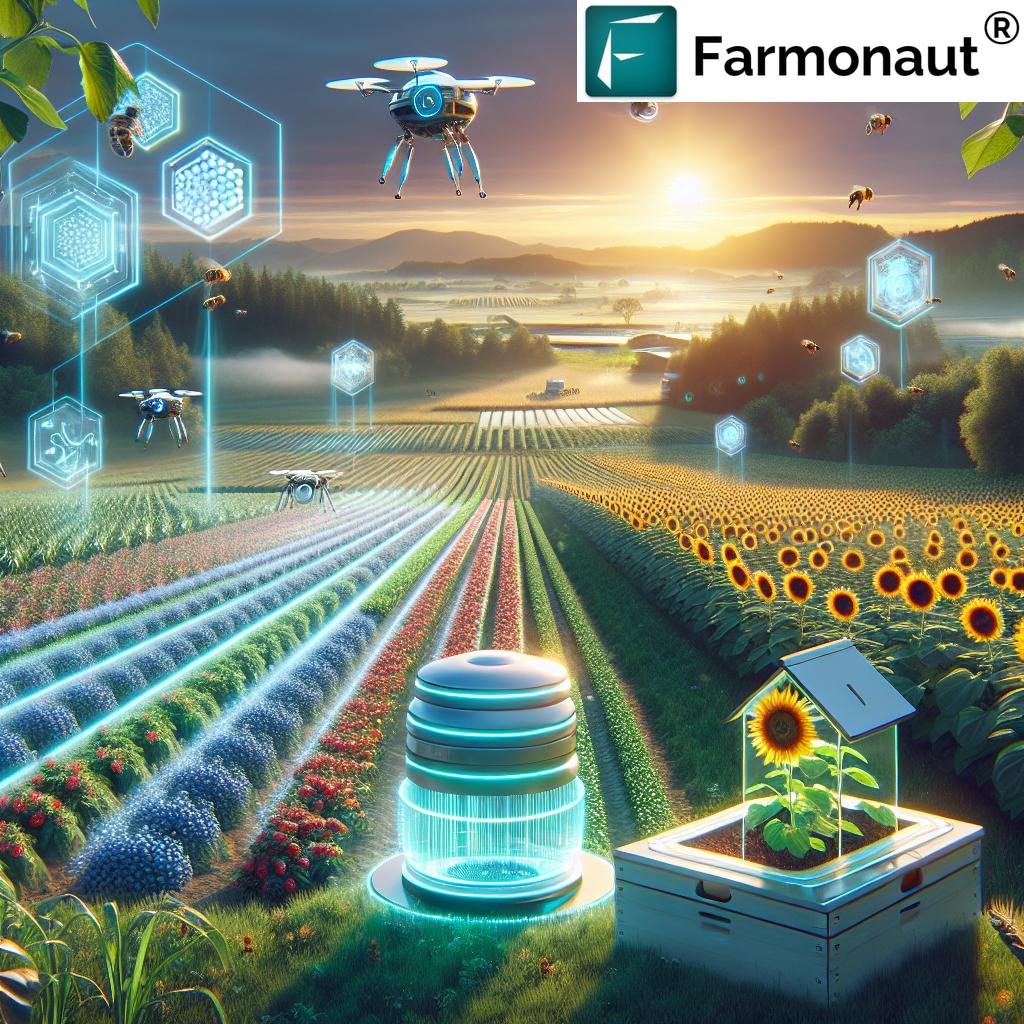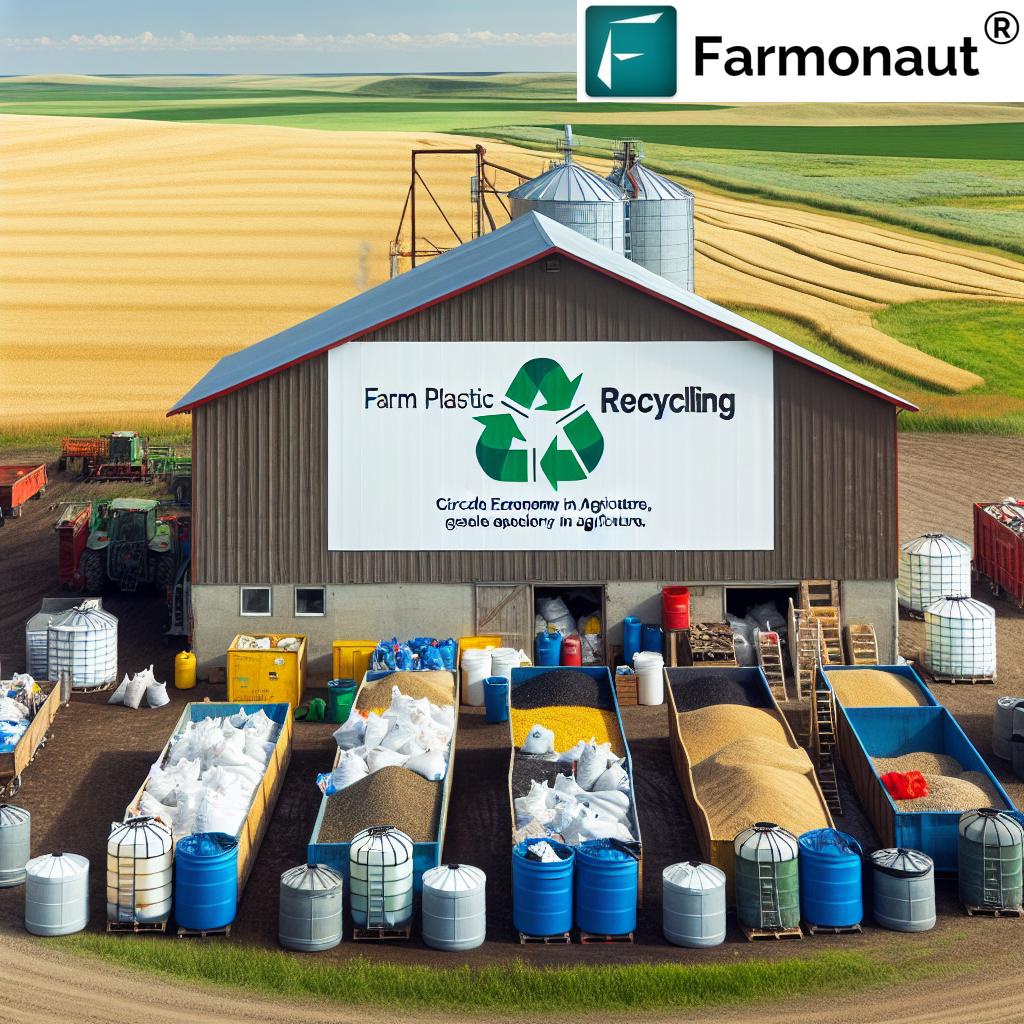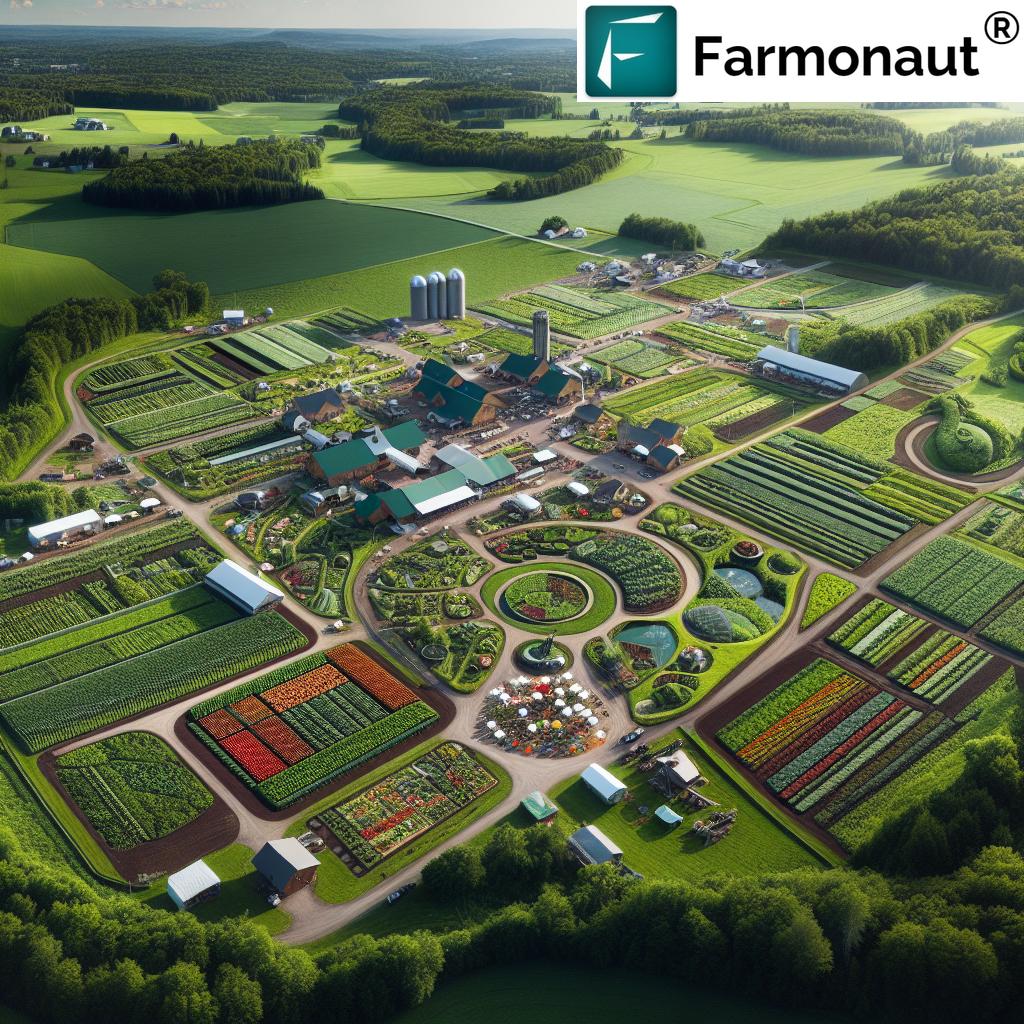Revolutionizing Canada’s Soy Industry: How AI and Innovative Processing Are Shaping the Future of Plant-Based Protein
“Canada’s new soy processing project targets the Japanese market, potentially impacting global plant-based protein trends.”
In the heart of Canada’s agricultural landscape, a groundbreaking transformation is underway. We are witnessing the dawn of a new era in the soybean processing and plant-based protein market that promises to reshape not only our domestic industry but also our position on the global stage. As we delve into this exciting development, we’ll explore how artificial intelligence (AI) and innovative processing techniques are revolutionizing Canada’s soy industry and paving the way for a sustainable, profitable future in plant-based proteins.
The Emergence of a Game-Changing Initiative
Protein Industries Canada has recently unveiled an ambitious project that aims to elevate the domestic processing of soybeans to unprecedented heights. This initiative, with a laser focus on developing a novel soy powder, brings together an impressive coalition of industry leaders: Alinova Canada Inc., Marusan Ai Co., Earth’s Own Foods, and Flamaglo Foods. Together, these powerhouses are setting their sights on capitalizing on the burgeoning demand for plant-based proteins, with a particular emphasis on penetrating international markets, especially Japan.
At the forefront of this endeavor is Alinova Canada Inc., a joint venture that marries the expertise of DJ Hendrick International Inc. (DJHII) with the prowess of Japanese industry giant Marusan Ai Co. Their mission? To create and commercialize a groundbreaking soy product that will redefine the market.

The Strategic Importance of Domestic Processing
This initiative builds upon the foundation laid by DJHII’s previous feasibility studies for a commercial soy powder processing facility in Eastern Canada. The decision to establish a pilot-scale processing facility in Ontario is no coincidence. This location was strategically chosen due to its robust local soy production capacity, positioning it as the ideal hub for innovation in the heart of Canada’s soybean country.
“A pilot-scale facility in Ontario will lead product development, boosting Canada’s domestic soybean processing capabilities.”
The importance of processing soybeans domestically cannot be overstated. By adding value to crops that have traditionally been exported for overseas processing, we’re not just enhancing our economic prospects; we’re strengthening the entire Canadian soy supply chain. This strategic move positions Canada to bolster its global agricultural competitiveness, particularly in the established and lucrative Japanese soy market.
The Economic and Consumer Impact
Kassandra Quayle, CFO of Protein Industries Canada, articulates the vision behind this initiative: “By bringing processing back to Canada, we’re opening doors to enhanced economic development and providing high-quality protein options for consumers both at home and abroad.” This sentiment encapsulates the dual benefit of the project – economic growth and consumer satisfaction.
The collaborative efforts between the partners are already bearing fruit. Earth’s Own and Flamaglo Foods have begun testing small batches of soymilk powder, a precursor to the innovative products that will soon grace grocery store shelves across Canada and beyond.
Investment and Innovation: The Numbers Speak
The scale of this initiative is reflected in its financial backing. A total investment of $23.9 million has been allocated, with Protein Industries Canada contributing a substantial $6.7 million. This financial commitment is complemented by additional investments from project partners, underlining the collective belief in the transformative potential of this venture.
David Hendrick from Alinova Canada puts this investment into perspective: “We’re not just exporting non-GMO whole soybeans from Eastern Ontario anymore. We’re transforming these exports into higher-value Canadian-made ingredients that will enhance the well-being of our communities.”
Global Demand and Sustainable Supply Chains
Hiroyuki Inagaki, President of Alinova Canada, offers insight into the global context: “The demand for plant proteins is skyrocketing worldwide. Our collaboration with Canadian growers ensures a sustainable supply chain that benefits both our producers and the Japanese market.”
This project is a cornerstone in Protein Industries Canada’s broader strategy to harness a $25 billion opportunity within the ingredient manufacturing, food processing, and bio-product sectors. The ripple effects of this initiative are expected to generate jobs and drive economic growth across the country, cementing Canada’s position as a leader in agricultural innovation.
The Role of AI in Revolutionizing Soy Processing
Artificial Intelligence is playing a pivotal role in transforming Canada’s soy industry. Here’s how AI is being integrated into various aspects of soy processing and production:
- Precision Agriculture: AI-powered satellite imagery and data analysis help farmers optimize soybean yields by providing insights on soil health, crop stress, and optimal harvesting times.
- Quality Control: Machine learning algorithms are being employed in processing facilities to ensure consistent quality of soy products, detecting anomalies in real-time.
- Supply Chain Management: AI systems are streamlining logistics, predicting market demands, and optimizing inventory management for soy products.
- Product Development: AI is accelerating the creation of new soy-based products by analyzing consumer preferences and predicting successful formulations.
As we embrace these technological advancements, it’s crucial to have reliable tools that can support the industry’s growth. Farmonaut’s satellite-based farm management solutions offer valuable insights for soybean farmers, helping them make data-driven decisions to improve crop health and yield.

The Impact on Canadian Agriculture and Food Processing
The ripple effects of this soy processing revolution extend far beyond the immediate industry. Let’s explore the broader implications for Canadian agriculture and food processing:
- Enhancing Food Security: By boosting domestic processing capabilities, Canada strengthens its food security position, reducing reliance on imports for plant-based proteins.
- Driving Rural Economic Growth: The establishment of processing facilities in agricultural regions creates new job opportunities and stimulates local economies.
- Fostering Innovation Ecosystems: This initiative is likely to attract more agtech startups and research institutions, creating a vibrant innovation ecosystem around plant-based proteins.
- Sustainability Benefits: Advanced processing techniques often come with improved energy efficiency and reduced waste, aligning with Canada’s sustainability goals.
For those interested in leveraging satellite data for agricultural purposes, Farmonaut’s API offers a robust solution. Developers can integrate this technology into their own systems, further advancing the digital transformation of agriculture.

Global Plant-Based Food Trends and Canada’s Position
As we delve deeper into the implications of this soy processing revolution, it’s essential to contextualize it within global plant-based food trends:
- Rising Health Consciousness: Consumers worldwide are increasingly seeking healthier, plant-based alternatives, driving demand for innovative soy products.
- Sustainability Concerns: The lower environmental impact of plant-based proteins compared to animal-based ones is a significant driver of market growth.
- Technological Advancements: Improvements in food technology are making plant-based proteins more palatable and versatile, expanding their appeal.
- Regulatory Support: Many countries are implementing policies to promote plant-based diets, creating favorable conditions for market expansion.
Canada’s strategic focus on soy processing positions it to capitalize on these trends, potentially becoming a global leader in plant-based protein innovation and production.
The Japanese Market: A Key Target for Canadian Soy
The focus on the Japanese market in this initiative is strategic and significant. Here’s why:
- Established Soy Culture: Japan has a long-standing tradition of soy consumption, making it a receptive market for innovative soy products.
- Quality-Conscious Consumers: Japanese consumers are known for their high standards, aligning well with Canada’s reputation for quality agricultural products.
- Aging Population: Japan’s demographic trend towards an older population increases demand for nutritious, easily digestible protein sources like soy.
- Technology Adoption: Japan’s openness to food technology innovations makes it an ideal market for introducing AI-driven soy processing advancements.
By targeting Japan, Canada is not only tapping into a lucrative market but also positioning itself as a key player in the Asia-Pacific region’s plant-based protein landscape.
Innovative Soy Powder: A Game-Changer in Food Processing
The development of a new soy powder is at the heart of this initiative. Let’s explore why this innovation is so crucial:
- Versatility: Soy powder can be used in a wide range of food products, from beverages to baked goods, expanding market opportunities.
- Extended Shelf Life: Powdered form allows for longer storage and easier transportation, reducing food waste and logistical costs.
- Nutritional Customization: Advanced processing techniques enable the creation of soy powders with tailored nutritional profiles, meeting specific dietary needs.
- Improved Functionality: Innovative processing can enhance the powder’s solubility and texture, making it more appealing for food manufacturers.
This focus on soy powder production showcases Canada’s commitment to value-added agricultural products and food processing technology advancements.

Sustainable Plant Protein Supply Chain: From Farm to Table
The initiative’s emphasis on creating a sustainable plant protein supply chain is crucial for long-term success. Here’s how this is being achieved:
- Local Sourcing: By processing soybeans locally, transportation emissions are reduced, and freshness is maintained.
- Precision Agriculture: Utilizing advanced farming techniques to optimize soybean yields while minimizing environmental impact.
- Waste Reduction: Innovative processing methods aim to utilize more of the soybean, reducing waste in the production cycle.
- Traceability: Implementing blockchain and other technologies to ensure transparency throughout the supply chain.
For farmers looking to optimize their soybean production, Farmonaut’s mobile apps offer valuable tools for crop monitoring and management, contributing to a more efficient and sustainable supply chain.
Economic Impact: Jobs, Growth, and International Trade
The economic implications of this soy processing initiative are far-reaching:
- Job Creation: New processing facilities and associated industries will generate employment opportunities across various skill levels.
- Rural Development: Locating processing facilities in agricultural regions will boost rural economies and infrastructure.
- Export Revenue: By producing value-added soy products, Canada can increase its export revenues and improve trade balances.
- Innovation Spillovers: Advancements in soy processing technology may lead to innovations in other agricultural and food processing sectors.
This economic boost aligns with Canada’s goals for sustainable economic growth and positions the country as a leader in the global plant-based protein market.
Canadian Agriculture Innovation: Beyond Soy
While this initiative focuses on soy, it’s part of a broader trend of innovation in Canadian agriculture:
- Crop Diversification: Research into other plant-based proteins like peas, lentils, and chickpeas is ongoing, diversifying Canada’s protein portfolio.
- Agtech Adoption: The use of AI, IoT, and other technologies is spreading across various agricultural sectors, improving efficiency and sustainability.
- Vertical Farming: Urban agriculture solutions are being developed to complement traditional farming and enhance food security.
- Biotechnology: Advancements in plant genetics are helping develop crops that are more resilient to climate change and pest resistance.
These innovations collectively strengthen Canada’s position as a global agricultural powerhouse.

The Future of Plant-Based Proteins in Canada
As we look to the future, the prospects for plant-based proteins in Canada are incredibly promising:
- Market Expansion: With growing global demand, Canada is well-positioned to become a major exporter of plant-based protein products.
- Research and Development: Continued investment in R&D will likely lead to even more innovative soy and plant-based protein products.
- Sustainability Leadership: Canada’s focus on sustainable production methods could set global standards in the plant-based protein industry.
- Cross-Sector Collaboration: Increased partnerships between agriculture, food processing, and technology sectors will drive further innovation.
For those interested in staying at the forefront of these developments, Farmonaut’s API developer documentation provides insights into how satellite technology can be leveraged for agricultural advancements.
Canadian Soybean Industry Transformation
| Metrics | Before Initiative | Projected After Initiative |
|---|---|---|
| Annual Soy Production (tonnes) | 6,000,000 | 7,500,000 |
| Domestic Processing Capacity (%) | 30% | 60% |
| Export Value (CAD millions) | 2,500 | 4,000 |
| Jobs in Soy Processing Sector | 5,000 | 8,500 |
| Market Share in Japanese Plant Protein Market (%) | 5% | 15% |
| Key Innovation Areas | AI-powered processing, Innovative soy powder development, Sustainable supply chain management | |
Conclusion: A New Chapter in Canadian Agriculture
As we conclude our exploration of this groundbreaking initiative in Canada’s soy industry, it’s clear that we stand at the threshold of a new era in agricultural innovation and plant-based protein production. The convergence of AI, innovative processing techniques, and strategic market targeting is set to propel Canada to the forefront of the global plant-based protein market.
This initiative not only promises economic growth and job creation but also aligns with global trends towards sustainable and health-conscious food choices. By focusing on value-added soy products and targeting key markets like Japan, Canada is positioning itself as a leader in the plant-based revolution.
The ripple effects of this project will be felt across various sectors, from farming communities to international trade relations. As we move forward, the continued collaboration between industry, government, and technology providers will be crucial in realizing the full potential of this transformation.
For those looking to be part of this exciting journey in agricultural innovation, tools like Farmonaut’s satellite-based solutions offer valuable support in crop management and decision-making. As Canada’s soy industry evolves, embracing such technologies will be key to staying competitive and sustainable in this rapidly changing landscape.
FAQs
- How will this initiative impact Canadian soybean farmers?
This initiative is expected to increase demand for Canadian soybeans, potentially leading to higher prices and more stable income for farmers. It also encourages the adoption of advanced farming techniques to meet quality standards for processing. - What role does AI play in soy processing?
AI is used in various aspects of soy processing, from optimizing production lines to quality control. It helps in predicting market demands, managing supply chains, and developing new soy-based products. - How does this project contribute to sustainability?
By processing soybeans domestically, transportation emissions are reduced. Additionally, advanced processing techniques aim to minimize waste and energy consumption, contributing to a more sustainable food production system. - Will this initiative affect the availability of non-GMO soybeans?
The project emphasizes the use of non-GMO soybeans, which may increase their cultivation. This could lead to greater availability of non-GMO soy products in both domestic and international markets. - How can small-scale farmers benefit from this development?
Small-scale farmers can benefit through increased demand for their crops and potential access to new markets. They may also gain access to advanced farming techniques and technologies that can improve their yields and crop quality.













